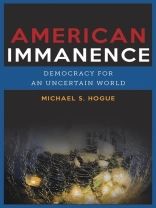The Anthropocene marks the age of significant human impact on the Earth’s ecosystems, dramatically underscoring the reality that human life is not separate from nature but an integral part of it. Culturally, ecologically, and socially destructive practices such as resource extraction have led to this moment of peril. These practices, however, implicate more than industrial and economic systems: they are built into the political theology of American exceptionalism, compelling us to reimagine human social and political life on Earth.
American Immanence seeks to replace the dominant American political tradition, which has resulted in global social, economic, and environmental injustices, with a new form of political theology, its dominant feature a radical democratic politics. Michael S. Hogue explores the potential of a dissenting immanental tradition in American religion based on philosophical traditions of naturalism, process thought, and pragmatism. By integrating systems theory and concepts of vulnerability and resilience into the lineages of American immanence, he articulates a political theology committed to democracy as an emancipatory and equitable way of life. Rather than seeking to redeem or be redeemed, Hogue argues that the vulnerability of life in the Anthropocene calls us to build radically democratic communities of responsibility, resistance, and resilience. American Immanence integrates an immanental theology of, by, and for the planet with a radical democratic politics of, by, and for the people.
Tabela de Conteúdo
Acknowledgments
Introduction
1. American Exceptionalism and the Redeemer Symbolic
2. The Anthropocene and Climate Wickedness
3. Thinking, Feeling, and Valuing Immanence: American Immanental Philosophies
4. Divining Immanence: American Immanental Theologies
5. Toward a Theopolitics of Resilient Democracy
Notes
Bibliography
Index
Sobre o autor
Michael S. Hogue is professor of theology at Meadville Lombard Theological School. He is the author of
The Tangled Bank: Toward an Ecotheological Ethic of Responsible Participation (2008) and
The Promise of Religious Naturalism (2010).







![Capa do Brian Schrag & Julisa Rowe: Community Arts for God's Purposes [Chinese] 貼近神心意的社群藝術 Capa do Brian Schrag & Julisa Rowe: Community Arts for God's Purposes [Chinese] 貼近神心意的社群藝術](https://static.worldofdigitals.com/thumb_webp/740/9781645083740.webp)




